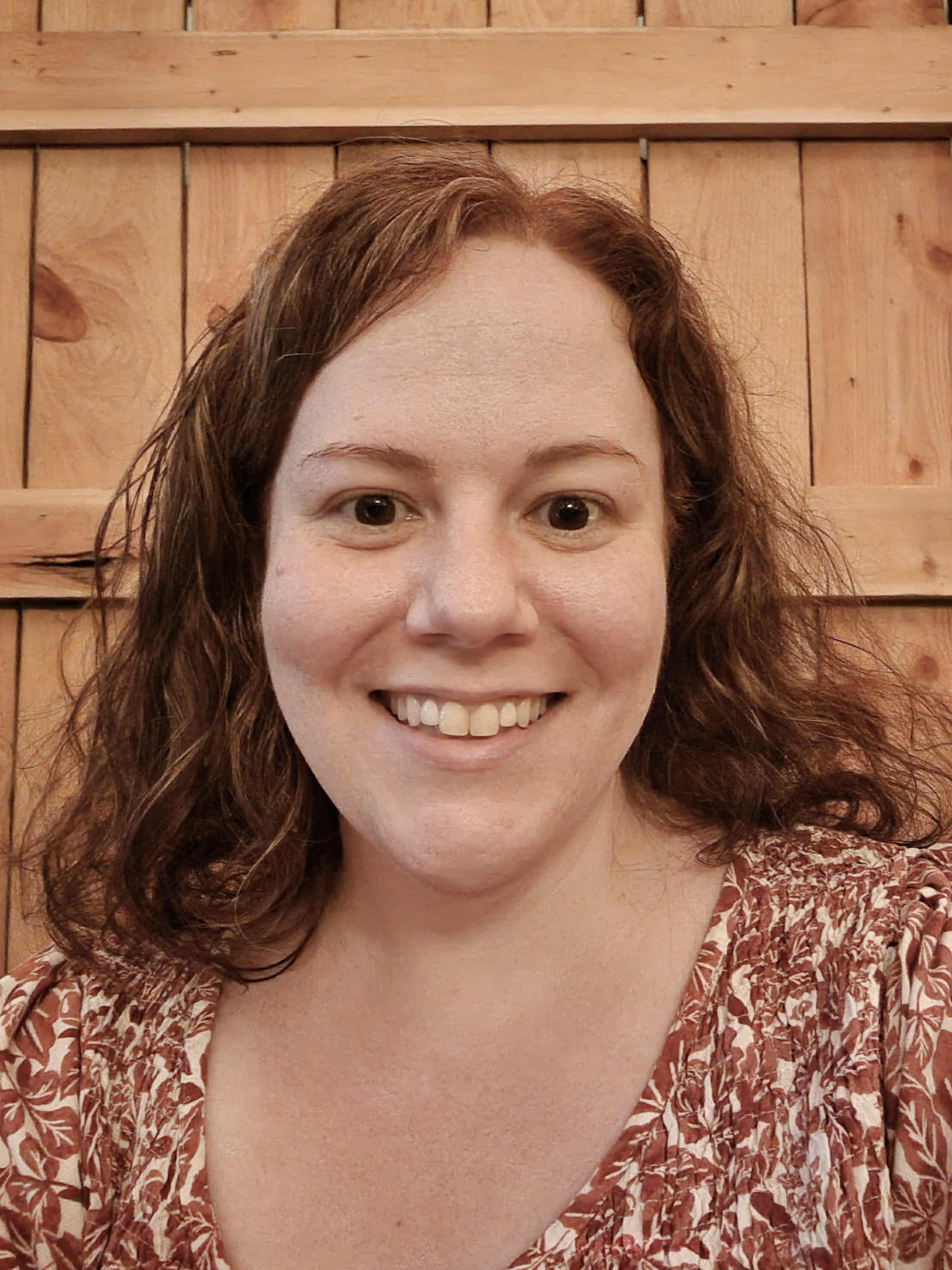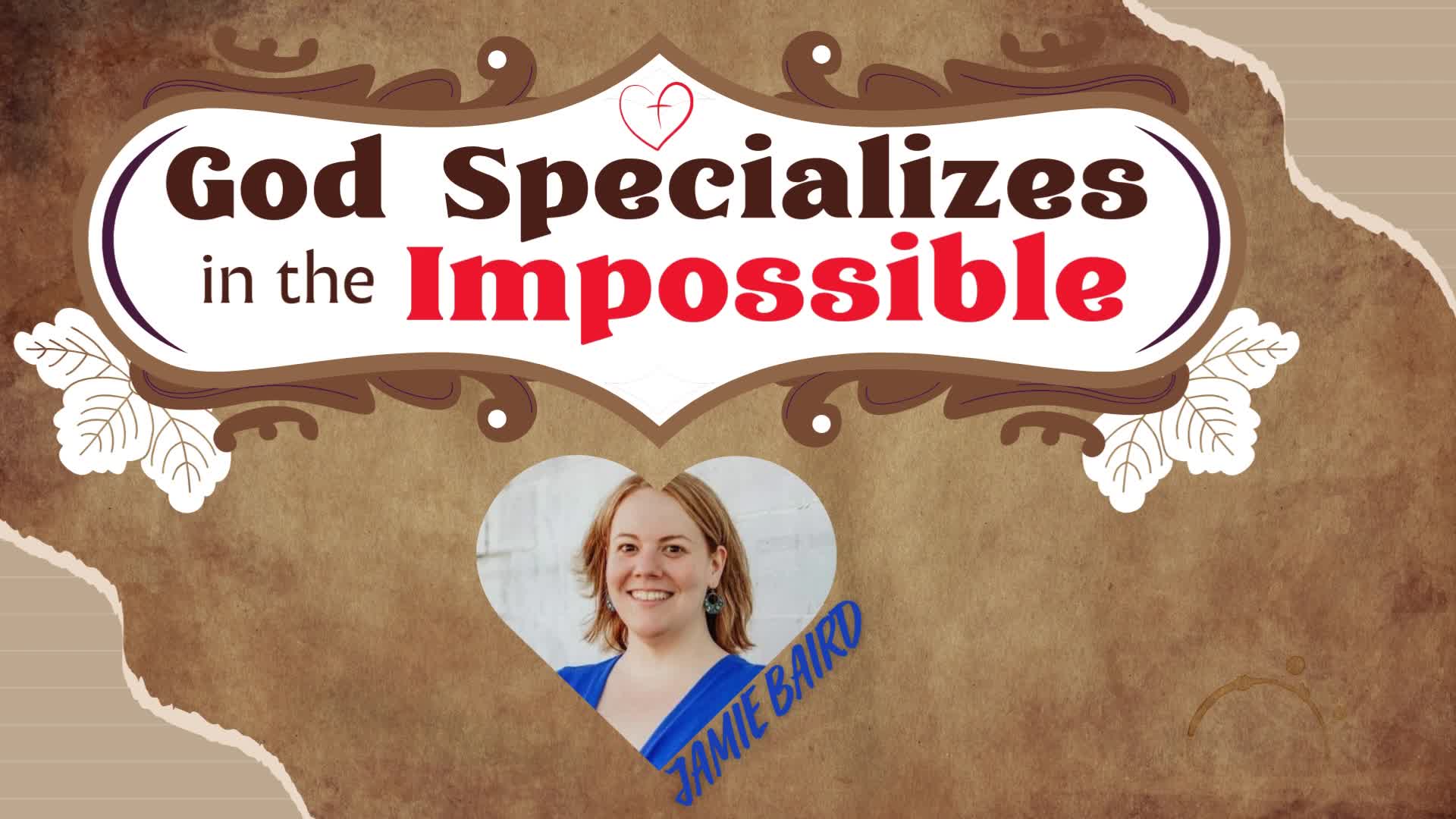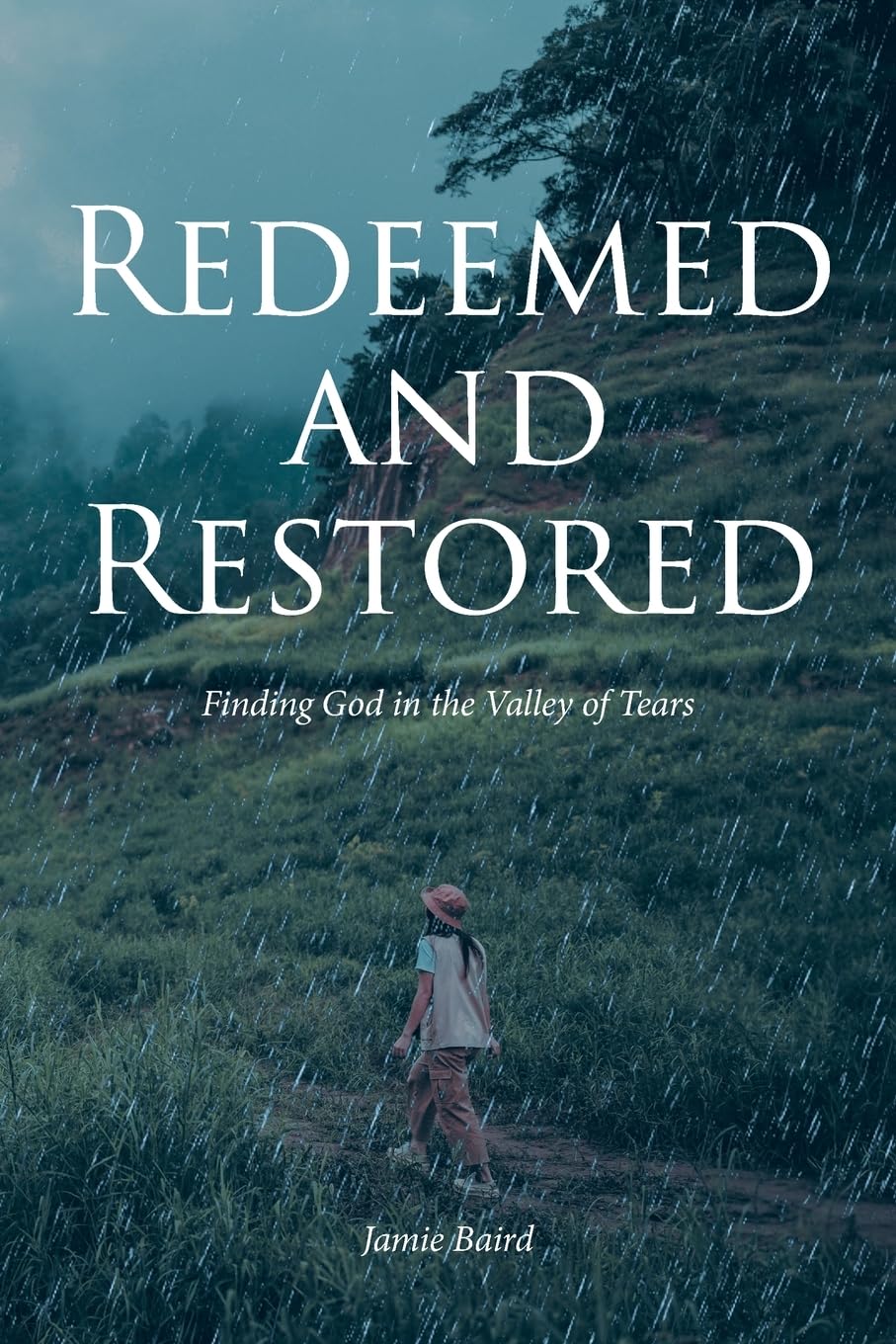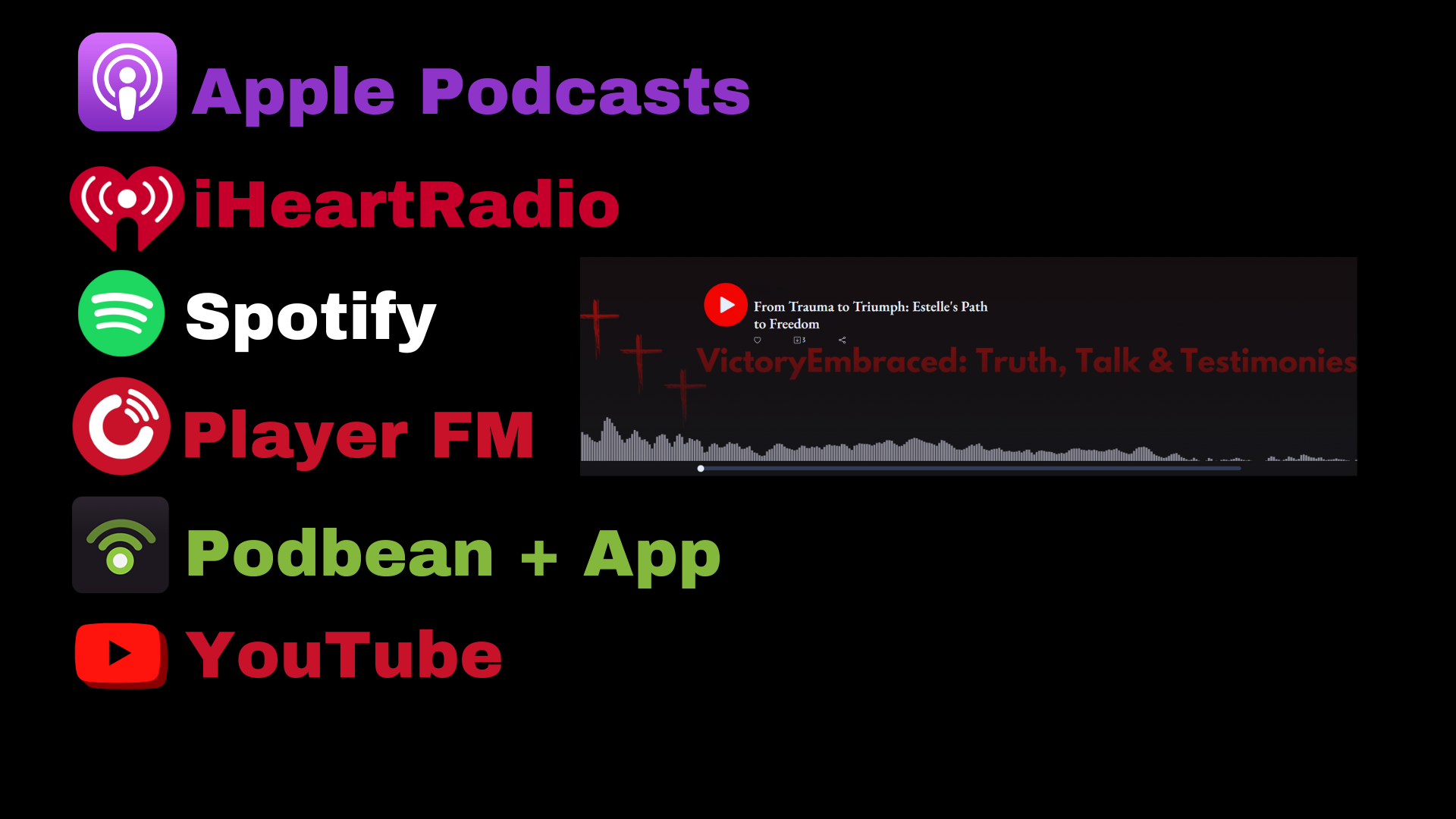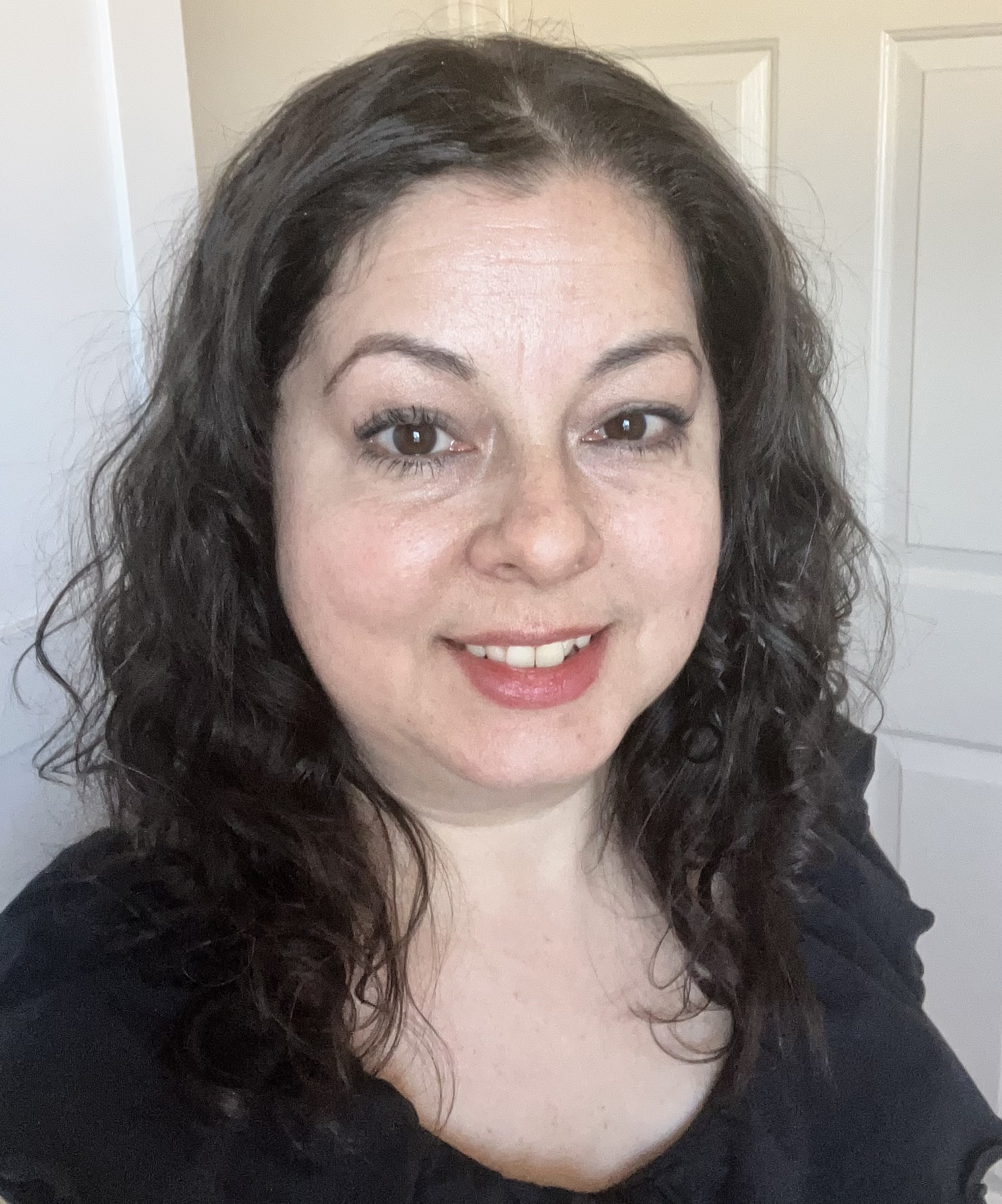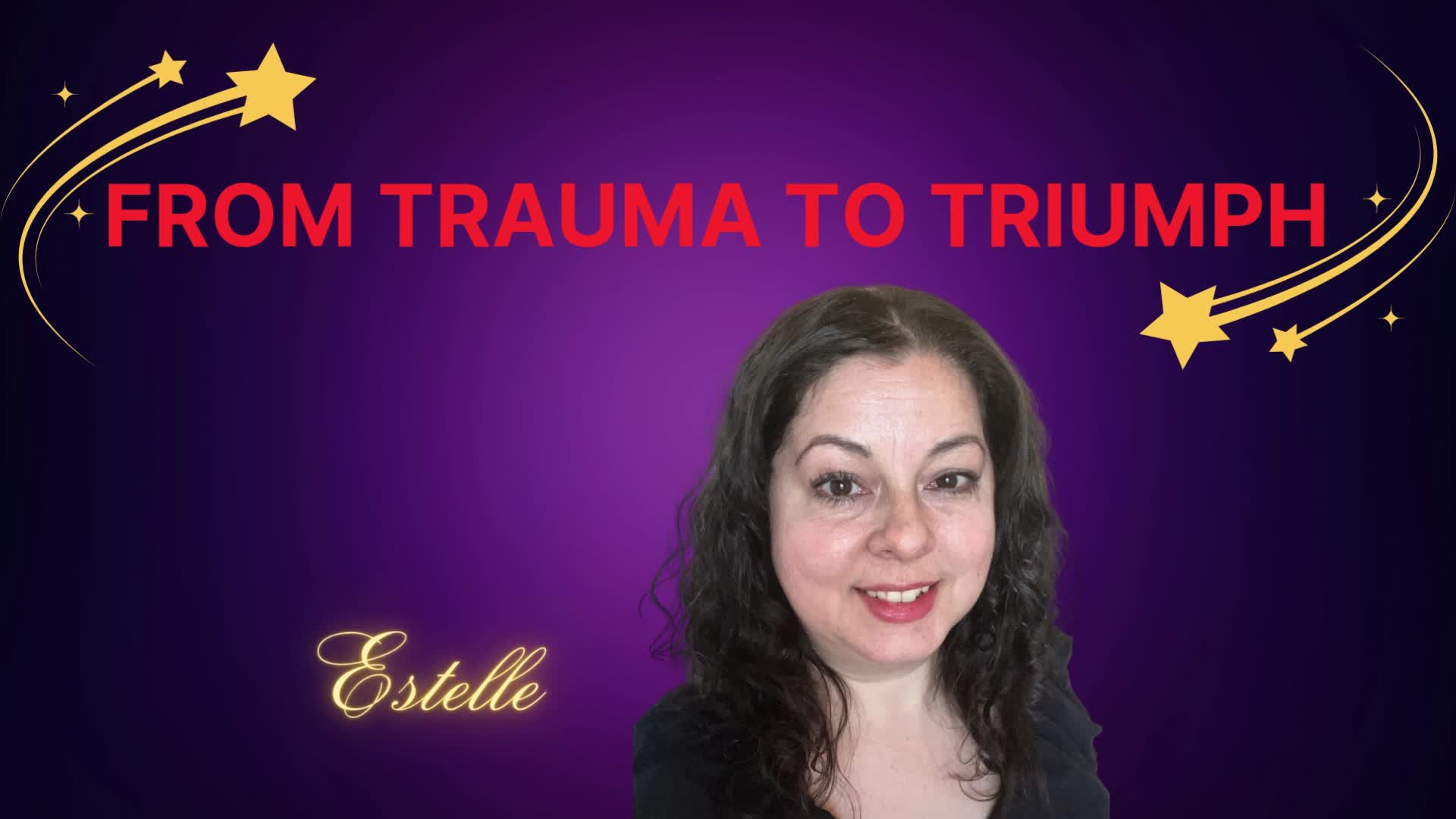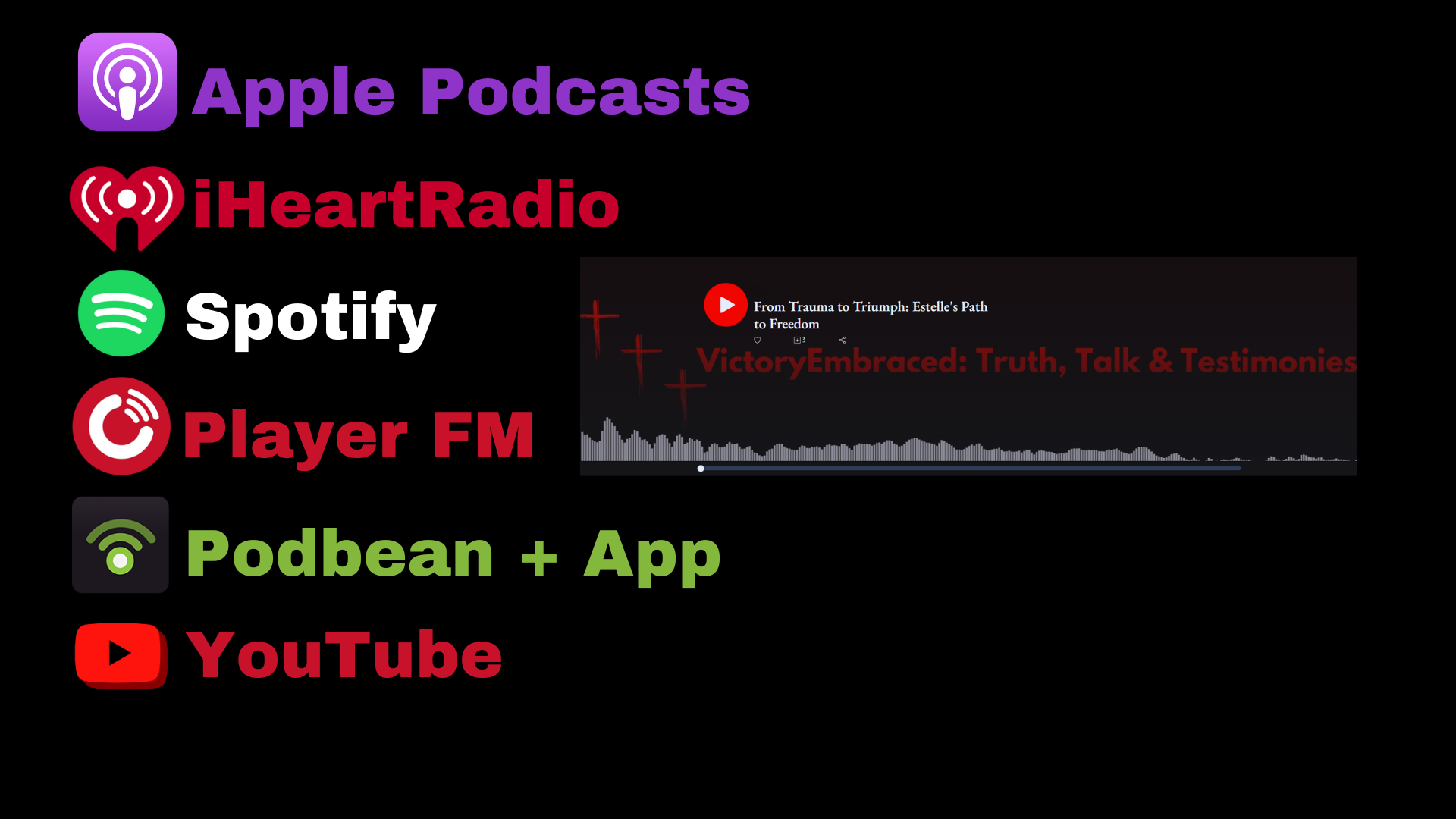Jamie gave her life to Christ as a child but drifted away from her faith. Just weeks before her second anniversary, her husband asked for a divorce, but God stepped in and performed a miracle, restoring their marriage!
Jamie Baird
Author of Redeemed and Restored
Finding God in the Valley of Tears
These are Jamie's favorite scriptures...
Jamie's Book
Click on the cover to order your copy today!
Jamie shared her story on Truth, Talk & Testimonies
Jamie's testimony is also on VictoryEmbraced: Truth, Talk & Testimonies podcast platforms
How old were you when you gave your life to Christ?
My parents raised me in a Christian home—we joke that I was born on a Sunday, and then the following Sunday, I was at church, and that was pretty much my whole experience growing up. I remember my dad leading me to the Lord, when I was four. My dad walked me through the Roman road to salvation, and I believe it was a Wednesday night when I came home from church asking questions. He made it very simple to understand that I was a sinner even at the age of four—we’re all born sinners—and that Jesus was the only way to forgive sins and to go to heaven.
When you went to college, were you still following Christ there too?
Yes. My parents ensured we were in church and were there whenever the doors opened. I went to a private Christian school, K-12, and after that, I went to a local secular university where I was on fire for God. I led a Bible study on campus, and my faith was very grounded—the worldview of a secular education didn’t affect me. What happened to me reminds me of the scripture that talks about how Satan is like a roaring lion walking to and fro seeking whom he can devour, and it just takes a small opening to start getting in trouble. One benefit of being saved at such a young age is that you are sheltered from many influences and things that can cloud your faith. Still, on the catch side, sometimes when you’re saved at such a young age, you’re so sheltered or protected that your faith kind of never really has an opportunity to grow like a muscle or grow and be exercised because, again, you’re insulated, and so it was after college that was the first time that my faith had been tested—some things were going on in our church in terms of division. There were people I looked up to that I saw doing things that I knew were not biblical, and for the first time in my life, it caused me to step back and say, “Well, if this is how God lets his people do things or live, then what’s the point of following God?” If He’s in control and this stuff still happens, what’s the point? We have free will, but our lives should align with scripture and the fruit of the spirit if we’re true Christians. And this was the quick dive of turning my back on my faith for some time.
What happened next?
After college, I moved away for what began as law school, but became graduate school instead, so I moved from North Carolina to Virginia. This was the first time being on my own as an adult, so here I am—I’m 21—and the first time living away from my parents, and it was sort of that perfect storm of freedom as a young adult plus questioning: not necessarily salvation but God’s plan and sovereignty and no one was hovering over my shoulder saying, “How’s your walk with the Lord?” It’s easy to walk the walk still and talk the talk over the phone or when you go home to visit—to act one way and do the other.
What kind of things were going on that you were drifting slowly from the Lord, but it started to happen quickly?
It was in about six months—that’s how quickly it all began. I distinctly remember being in my car in a parking lot before I moved to Virginia, and I was trying to pray. I felt like my prayers were bouncing off the hood of my car, and I didn’t think that God was hearing me. I got angry and so mad at God, and I told Him in my anger that if this is how He treats His children, I don’t want any part of Him. I decided that day that everything I knew was wrong, and I was going to do and figure out what I’d been missing out on. Those rebellious seeds sprouted and took off like a wild vine.
Was it during that time that you met your husband?
Not long after. I moved to Virginia in August 2009. I met my husband in August 2010, so within one year and during that year, if you did not know me, you would have thought being a Christian was the last thing you would have thought I was. Now again, I could pretend when I was around other Christians, but I also quickly figured out how to blend in with the world. It was at that time that I met my husband—I was actually in England at the time, participating in a summer abroad program for grad school, and we ended up meeting online because I didn’t know very many people in Virginia and the school I went to, oddly enough, was a Christian university, so the irony was not lost but I knew at the time I did not want to meet anyone at the university that was not a goal—I was too deep in the rebellion. I ended up meeting my husband online, and when I came back from England to return to Virginia, we went on our first date on August 3rd, 2010. It was a quick romance—we had much in common and similar interests. He had been in the Navy, so he had a lot of life experience and traveled—it was an instant connection, and he had no religious background—so he was perfect for me at the time. He didn’t meet his dad until he was 16, so he grew up with his mom, the family’s black sheep. You could say she moved far away from family, so it was just him and his mom, and he grew up completely non-religious. When he was in his teens and early 20s, he was exposed to a lot of different religions–he went to a mosque, he went to a Buddhist temple, went to a Mormon temple–he dabbled in pretty much every major religion, more from an anthropological sense of wanting to understand the cultures.
Did you get married soon after you started dating?
Yeah. We got married on the second anniversary of our first date, August 3rd, 2012, in North Carolina, and about a week later, I started my first year of teaching. We were, you know, young, married, happy, and excited to be starting our lives together.
What happened before your second anniversary?
Because I was a teacher, I had summers off. We decided to take an epic road trip out west because he had grown up in Colorado, and I’d never traveled past the Mississippi, so I was very eager to explore. And we decided we have the time, we have the money–let’s do it, so we left North Carolina and went to Texas. We went and picked up his mom. A few weeks before our second anniversary, we traveled north through New Mexico, Colorado, up to Idaho, and back down. We were in Jackson Hall, Wyoming, and had just visited the Teton mountain range and had the trip of a lifetime, and we were exploring a coffee shop. I had just sat down with my drink, and he just turned to me and calmly and nonchalantly said, “I want a divorce; our marriage is over,” and this came out of nowhere. We had been on vacation, and we hadn’t been fighting, and I remember thinking, “Can we at least fight first?” It was out of the blue and almost like a sick joke. It was shocking and completely out of left field. After recovering from the shock, I tried to ask him if he was serious. And why was he doing this?
I mentioned earlier that my husband was in the Navy. I knew that he had PTSD; that was something that we had talked about when we were dating, but I honestly didn’t understand PTSD—it’s not just one of those things that you have and it goes away—it’s something that, much like depression, can flare up. I was very ignorant of it, and to a degree, my husband was too. One of the things about PTSD is it causes emotional detachment. The reason is it’s almost a defense mechanism—I’m going to push someone I love away so that I don’t drag them down the hole with me—I’m going to save them from my demons or darkness, so that’s one of the big reasons why so many people with PTSD end up not living, or their marriages tend not to work. It’s a very dark time for so many.
So, were you separated from your husband for a long time, or did you get divorced?
I convinced him to at least come back from our trip. He was still enrolled in college and had already paid the tuition. I told him that he might as well finish the semester, and he agreed. I felt like that was a win. At least I convinced him to come home. I thought he would be reasonable and understand once we returned to our routine. That was naïve. When we got home, we walked into a storm reflective of what was happening in our lives. Our apartment was inundated with a water leak from the unit above us. You can imagine the July heat in North Carolina; it was infested with mold, so we walked in from our marriage being over to you can’t live here anymore, so we went into survival mode by pushing our emotions to the back burner to let’s try to figure out where we’re going to sleep tonight. That got us through for about a month, and then school started back for me that August and my husband also was in school.
We coexisted as roommates for a while, and I was trying to navigate this new normal of him being home. We were married, but he was still adamant about leaving in December when his semester ended. I was wondering why and still didn’t understand, and he couldn’t quite explain it—it was one of those things of I’m doing this because I love you, which was so counterintuitive in my world—I was like, "Well, if you love me, why are you leaving me?" So, I couldn’t get past this. We lived in the same house for that semester but were strangers. I didn’t know my husband anymore—he was like a stranger. In December, a week before Christmas, literally about two days after his semester officially ended, he packed up his pickup and left. I didn’t even know where he was going, which was hard. All I knew was that he was going west. He had some family in Texas but wouldn’t tell me where he was going. I remember asking him, “Well if you have to leave, will you at least promise that we will have a goal of reconciliation?” Him telling me that our marriage was over is what jerked me out of my rebellion, and it’s what brought me back to God almost immediately. I distinctly remember that day when he told me that our marriage was over, going back to the hotel, locking myself in the bathroom and sitting on the floor sobbing and, for the first time in two or three years, praying and saying to God—"It hurts, God—it hurts." For the first time in a long time, I didn’t have to wear the mask—you know, the good little Christian girl mask—I was just raw, and I remember the Lord’s small voice so loud in my heart saying, “Are you done doing things your way?” And I knew I had a choice to make. I could keep doing it my way, which was not working despite my best efforts, or I could try it God’s way, and at that point, I was smart enough to know that my way was not working out. At that moment, I surrendered, and that changed not only my life but also both of our lives.
Can you tell us how God got your husband’s attention?
One of the great things about God is that He’s in the details and always working, even when we don’t think He is or when we can’t see what’s going on. One of my favorite Bible stories is of Zacchaeus because, you know, we always sing the song about how he climbed up in a sycamore tree. still, then, that sycamore tree had to be planted however many years before Zacchaeus was ever born, or to be big enough, tall enough, and strong enough to support a grown man climbing in it to see the Lord, but that’s just like God to plan and create a way when we’re not paying attention.
One thing that happened that Christmas before our trip was that we were at a Hobby Lobby, probably buying more Christmas decor that I did not need, and a local church group was out front passing out treat boxes. In the South, that’s a thing around Christmas. You know, people will pass out fruits, nuts, and candies. It’s just kind of a thing, and I remember getting that and going to the car and breaking down in tears for no reason other than that it pricked my heart even then. However, I was still too much into the rebellion to surrender then, but when I surrendered in Jackson Hole, Wyoming, it was like God brought that moment to my mind. I remember telling my husband on the ride home from the West to North Carolina, that I needed to go to church; he asked why because we had only been to church once or twice since we’d known each other, and asked which church I would go to. I responded, “Well, maybe I should check out the church that gave us that box.” I didn’t know why, but I needed to find that church. I couldn’t remember the name of the church. I knew it started with the letter p, and in the South, there’s a church on every corner, so I was like, I’m going to have to try to narrow this down a little. I even called Hobby Lobby to see if the employer remembered a church group about eight months ago. He probably thought I was crazy and had no clue what I was talking about. Still, I ended up Googling the Baptist churches in the area that began with the letter p, and I had a result pop up. Hence, the first Sunday we were back, I went, and I remember sitting in the parking lot glued to my car—I was anxious and knew that going to church was the first big step back.
I had already repented, but walking into a church alone was different, so I mustered up the courage and marched on into an oasis. People were so kind and welcoming, and every sermon was like I thought there were cameras in my house because every sermon was perfectly tailored to what I’d been going through. It was surreal to me how God was ordering my steps. For the first time in a long time, I felt a deep hunger for the things of God, and it was exactly what I needed. It wasn’t doing things out of a checklist mentality or, if I don’t do this, I’m not a good Christian—for the first time, I craved praying and reading my Bible. Also, when I prayed for the first time, I felt as if I were talking to God. It was a fantastic feeling, even though my personal life was chaotic. I would go from depression to wanting to beat my husband up to wondering if I’ll be getting divorced after only two years of marriage—like, what in the world? This isn’t Hollywood. The church I started attending poured into me, and they saw someone hurting, and there was no judgment—it was just love.
How did you two get back together?
Only God! My husband left a couple of weeks before Christmas, and it felt as though Satan had won. I thought God would save the day, and there was even a moment when he pulled off and got halfway up the driveway. He stopped the truck, threw it in the park, came running back in, and kissed me, and I thought I had my husband back—he wasn’t a stranger anymore, and it was the guy I knew, but then he went back to the truck and kept going, and I remember just sitting outside in the cold. I knew God was in control, and I had a choice to make. I could either trust God even when it did not seem possible or go back to trying to run my life, and I knew that was not an option, so I decided to trust God. It was interesting because every time I felt like it was too hard and I needed to walk away from this, God would send someone who knew nothing about what I was going through and give me a scripture to encourage me. This one lady at my church, who knew very little about what was going on in my life, gave me a towel, like one of those decorative towels that said Believe on it. I was doubting how God was going to do anything here—my husband moved out, and I had some people telling me what he did was grounds for divorce—he’s abandoned you. There’s nothing in scripture that says that if an unbelieving spouse walks away, you have to stay and that I had biblical grounds for a divorce, but when I would pray and ask God what to do, I never had peace about divorce. I even remember praying for God to let me out of this because it hurt too much holding on. I didn’t even know where he was living, but repeatedly, I would hear God saying, “Be still, trust me in the waiting.” I believe God used that time to show me that Jesus is all I needed, whether my marriage was restored or not—Jesus was enough.
It was interesting because, before this, I never realized how much of my identity as a woman was wrapped up in being a wife. It was almost like my self-worth was tied to my marriage, so I didn’t feel I knew who I was when he left. I had to learn who I was in Christ. My identity is found in Christ, not in any relationship, career, or anything else.
I found out through snooping—I’m not proud of it. It was a weak moment, and I still had passwords to emails and all that fun stuff, but I found out that he was in Washington State. I was happy to know where he was, but it scared me knowing how far he was because that’s 3,000 miles away; he might as well be on the moon, but God used that time to teach me to trust Him because I had no contact with my husband. I would try to text or call him occasionally and get a response, but it was indeed a separation.
During this time, I prayed fervently for that man. At first, the prayers were, God, please fix my marriage, please fix my marriage, please fix my marriage, and that mattered because I don’t think anyone wants their marriage to fail. However, as I grew in my faith, God began to prompt me to pray differently and more specifically for my husband.
Instead of asking God to change him and make him come home, it became praying for his physical safety. I later found out my husband was dealing with a significant medical emergency during this time that he had not disclosed to me, but God would wake me up in the middle of the night telling me to pray for my husband’s health. It was heavy on my heart to pray for his salvation and claim him for God, and it sounded so odd. Still, I’m just like, you know what, God’s got me this far; whatever he tells me, I’m just going to go for it, whether it makes sense at the moment or not, and then I remember, you know, God would prompt me to pray for a hedge around him and growing up, I’d always heard you pray for a hedge of protection around someone. I didn’t understand what that meant, so I started digging through the Bible about where we get the phrase “a hedge of protection” and found that it differed from what I thought a hedge of protection was. Yes, it’s like building a fence around someone. Still, many times in the Bible, a wall of thorns was planted, so of course, thorns keep the enemies out. Still, they would also keep the sheep from trying to get out because the thorns would guide them to where they needed to be, and once I understood this, I said, “God—yes, definitely put some thorns around that man!” But it was more to steer him toward the Lord, and I began to pray that God would put people on his path to share Christ with him. I distinctly remember in May—he had been gone for almost six months—and I went to church on Wednesday night, and I was talking to the pastor and his wife, who were excellent; there were so many times when I crying and they were calm and ministered to me, giving me biblical counsel and I told them that I felt like I finally passed the test and finally learned that God’s enough, whether he fixes my marriage or whether I never see him again—God is enough.
I kid you not; my husband called me out of the blue the next day. I hadn’t heard his voice in at least three months, and he begged me if I was willing to take him back. He said he regretted leaving and how things had happened and wanted to know if anything was left to come home to. And I said, “Oh, my goodness, God, you answered my prayer.” I was in shock, but in my heart, I had thought—the way that I had told God this was going to work was he was going to save my husband; he was going to call me saying, “Honey, I’ve been saved—I’m sorry—we’re going to fix our marriage, and we were going to live happily ever after,” but that wasn’t quite how God decided to do it. He worked on my husband to the point where my husband wanted to reconcile our marriage, but my husband still had no interest in God whatsoever. So the school year was over in June, and he came back to North Carolina for a few weeks, and we had some very long talks, and I got a lot of counsel from my pastor and his wife just because I didn’t want to jump into anything because of what my heart was telling me. I wanted to make sure I listened to God and didn’t want to make any more mistakes. Of course, my family and friends didn’t want me to move out to Washington, and they were concerned that my husband would leave me again. I had a church, career, and support in North Carolina. I agreed with what they were saying, but in my heart, I just had an overwhelming peace that I needed to go to Washington—for how long, I did not know, but I knew where I needed to be. I waited for my niece to be born in July, then a few days later, packed up my tiny Ford Focus with everything I could fit. It took me three days, but I got to Liberty Lake, Washington, and arrived there one year to the day my husband told me our marriage was over. We began that slow, arduous process of rebuilding trust, tried to forge our new normal, and learned that rebuilding a marriage is not a happily ever after thing.
Each of us had baggage that we brought with us, and it was more than just what fit in the trunk of my car. You know, he still wasn’t a Christian. I was very different from what I was when he had left—we had to learn about each other all over again, but one of the things that happened when I moved there was, I knew I needed to find a church—a local body of believers to plug into. Of course, being so far away, I thought of using Google to see what I could find. A small church plant was only a year old, and within walking distance of our apartment, so I checked it out because it seemed pretty biblical from what they believed on their church website. It was so interesting; at the first service, I noticed they were using the same hymn book as the church I had been attending in North Carolina, and so many other things were reminiscent of home. When I walked into the church, it felt like I was home.
I met the pastor after the service. He discovered I was new to the area and asked if my husband was a Christian. I told him, “Not yet,” but I knew God didn’t bring me to Washington only to do half of the job—whatever He does, He’s going to complete. It just so happened that the pastor was a Navy veteran with a heart for veterans. There are no coincidences with God. So I got plugged into that church, but my husband was leery of organized religion, but he forged a relationship with the pastor. They bonded over their shared experiences in the Navy, and I remember he came home one day after they had coffee together, and he said, “That guy is the real deal.” I asked him what he meant, and he shared that he’s not fake—he’s an authentic Christian. Now and then, my husband started coming to church with me without me asking him to, and he began to develop a hunger to know more. One time, we came home from church the following May, so I’d been there almost a year in Liberty Lake, and springtime in the mountains, it’s muddy, wet, and cold. We came home from church, and he was pacing the apartment to the point that I thought he would wear a hole in the carpet. My husband doesn’t cry—I think I saw him crying once when his dog died and another time when our son was born, but he was crying with tears pouring down his face saying, "I have to talk to a priest—I’ve got to speak to a priest". I told him, but you’re not Catholic. Then he said, “I’ve done too much in my life—there’s no way God would ever want me—I’ve crossed too many lines and crossed a point of no return, but maybe if I talk to a priest, they can do something.” I responded, “Well, why don’t you call Pastor Greg? He’s probably still at the church. Why don’t you talk to him?” And he said, “Okay, that makes sense.” I called Pastor Greg for him because he was so upset and asked, “Would you be willing to talk to Jason?” And, of course, he said yes and asked Jason if he could meet him on the mountain at Liberty Lake Regional Park. I was sitting at home praying because I sensed a shift in my husband. He was under such conviction and agitated. He was gone for 2-3 hours in the misty rain and mud, and finally, he came home and didn’t say a word—he took off his shoes, cleaned himself up, and went to the garage, and I was left wondering—Okay, what happened? He was gone for 2-3 hours. Did he have a Moses experience with a burning bush? Did he get saved? So, I texted Pastor Greg, who said he just asked many questions, and I answered them. I wanted to rush God, but I knew it had to be His timing and way.
About a month later, in June, I was at church. My husband had been going with me every week, which was not the norm for him. But that week, he said he wasn’t going that morning, and I was thrown off. I asked if he was sick, but he said he was fine. So, I went by myself, and right before the service started, the pastor announced that we would go down to the Spokane River for a baptism after church. It’s a relatively small church. I’m looking around like everyone here had already been baptized, and then I think, well, maybe a kid got saved, and I didn’t know or realize. At about that time, my husband strolled in, helmet in one hand and a bag of clothes in the other. He had the biggest smile on his face, and so did Pastor Greg, so I was a mess when he was getting baptized and so excited. I talked to him afterward and asked him when he gave his life to Christ. He shared that after he spoke with the pastor on the mountain, he started reading the Bible later that week, and everything clicked —everything made sense—God is real!
After getting baptized, his relationship with the Lord accelerated, and he would wake up each morning to read the Bible, get involved in the church, and attend Bible college to learn more scripture. God helped him with PTSD, and his quick temper began to go away. The emotional distance, numbness, and callousness began to be replaced by gentleness and greater self-awareness—God was healing him, and it was miraculous. We even burned the divorce papers. God specializes in the impossible—only He can do such things and never wastes our pain.
